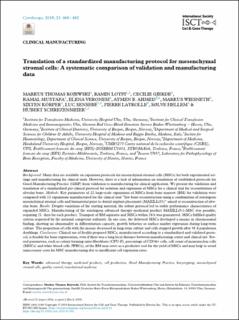| dc.contributor.author | Rojewski, Markus Thomas | |
| dc.contributor.author | Lofti, Ramin | |
| dc.contributor.author | Gjerde, Cecilie Gudveig | |
| dc.contributor.author | Mustafa, Kamal Babikeir Eln | |
| dc.contributor.author | Veronesi, Elena | |
| dc.contributor.author | Ahmed, Aymen B | |
| dc.contributor.author | Wiesneth, Markus | |
| dc.contributor.author | Körper, Sixten | |
| dc.contributor.author | Sensebé, Luc | |
| dc.contributor.author | Layrolle, Pierre | |
| dc.contributor.author | Hellem, Sølve | |
| dc.contributor.author | Schrezenmeier, Hubert | |
| dc.date.accessioned | 2021-04-23T07:46:16Z | |
| dc.date.available | 2021-04-23T07:46:16Z | |
| dc.date.created | 2019-06-05T16:14:20Z | |
| dc.date.issued | 2019 | |
| dc.Published | Cytotherapy. 2019, 21 (4), 468-482. | |
| dc.identifier.issn | 1465-3249 | |
| dc.identifier.uri | https://hdl.handle.net/11250/2739251 | |
| dc.description.abstract | Background
Many data are available on expansion protocols for mesenchymal stromal cells (MSCs) for both experimental settings and manufacturing for clinical trials. However, there is a lack of information on translation of established protocols for Good Manufacturing Practice (GMP) from validation to manufacturing for clinical application. We present the validation and translation of a standardized pre-clinical protocol for isolation and expansion of MSCs for a clinical trial for reconstitution of alveolar bone.
Methods
Key parameters of 22 large-scale expansions of MSCs from bone marrow (BM) for validation were compared with 11 expansions manufactured for the clinical trial “Jaw bone reconstruction using a combination of autologous mesenchymal stromal cells and biomaterial prior to dental implant placement (MAXILLO1)” aimed at reconstruction of alveolar bone.
Results
Despite variations of the starting material, the robust protocol led to stable performance characteristics of expanded MSCs. Manufacturing of the autologous advanced therapy medicinal product MAXILLO-1-MSC was possible, requiring 21 days for each product. Transport of BM aspirates and MSCs within 24 h was guaranteed. MSCs fulfilled quality criteria requested by the national competent authority. In one case, the delivered MSCs developed a mosaic in chromosomal finding, showing no abnormality in differentiation capacity, growth behavior or surface marker expression during long-term culture. The proportion of cells with the mosaic decreased in long-term culture and cells stopped growth after 38.4 population doublings.
Conclusions
Clinical use of freshly prepared MSCs, manufactured according to a standardized and validated protocol, is feasible for bone regeneration, even if there was a long local distance between manufacturing center and clinical site. Several parameters, such as colony forming units fibroblasts (CFU-F), percentage of CD34+ cells, cell count of mononuclear cells (MNCs) and white blood cells (WBCs), of the BM may serve as a predictive tool for the yield of MSCs and may help to avoid unnecessary costs for MSC manufacturing due to insufficient cell expansion rates. | en_US |
| dc.language.iso | eng | en_US |
| dc.publisher | Elsevier | en_US |
| dc.rights | Attribution-NonCommercial-NoDerivatives 4.0 Internasjonal | * |
| dc.rights.uri | http://creativecommons.org/licenses/by-nc-nd/4.0/deed.no | * |
| dc.title | Translation of a standardized manufacturing protocol for mesenchymal stromal cells: A systematic comparison of validation and manufacturing data | en_US |
| dc.type | Journal article | en_US |
| dc.type | Peer reviewed | en_US |
| dc.description.version | publishedVersion | en_US |
| dc.rights.holder | Copyright 2019 The Authors | en_US |
| cristin.ispublished | true | |
| cristin.fulltext | original | |
| cristin.qualitycode | 1 | |
| dc.identifier.doi | 10.1016/j.jcyt.2019.03.001 | |
| dc.identifier.cristin | 1703031 | |
| dc.source.journal | Cytotherapy | en_US |
| dc.source.40 | 21 | |
| dc.source.14 | 4 | |
| dc.source.pagenumber | 468-482 | en_US |
| dc.identifier.citation | Cytotherapy. 2019, 21(4): 468-482 | en_US |
| dc.source.volume | 21 | en_US |
| dc.source.issue | 4 | en_US |

